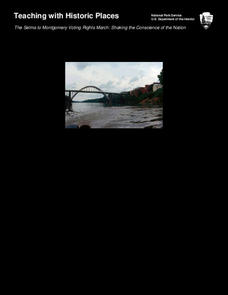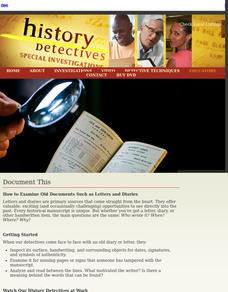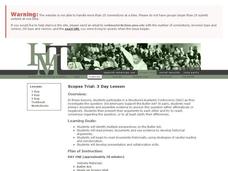DocsTeach
Can you Identify the First Lady?
Guess Who? The first lady edition! Scholars read documents to figure out the first lady that is being described. The activity focuses on Pat Nixon, the wife of President Richard Nixon. Academics then work in pairs and share their...
DocsTeach
To Sign or Not to Sign
To sign or not to sign, that is the question. Scholars review the Declaration of Independence and discuss the Framers' decisions for signing the document. The activity uses primary text, a worksheet, and group discussion to help...
DocsTeach
Analyzing a Letter About Ford Pardoning Nixon
Out of the mouth of babes ... often times comes gems. The activity uses a letter written by a third-grader in 1974 regarding President Ford's pardon of Richard Nixon. Scholars analyze the letter, complete a worksheet, and participate in...
DocsTeach
Twelve Years a Slave
It's difficult to truly grasp the effects of slavery. Young historians use historical analysis to understand the struggle of slavery on African Americans. The resource provides text from the autobiography Twelve Years a Slave to help...
Smithsonian Institution
Hidden Histories: Mexican Repatriation During the 1930s
Mexican Repatriation: the forgotten deportation of American citizens. The resource focuses on the deportation of Mexican American citizens during the Great Depression. Young historians read documents, complete a free-write, and fill out...
TCI
Picking Rusty Gold: Why Do People Buy and Sell Antiques?
Your historical sleuths will work to research the in-depth history of chosen artifacts and will use their research to design a fictional advertisement for an early 20th century item.
Mr. Roughton
The Travels of Marco Polo
Were the stories of Marco Polo's travels and interactions with the Mongols actually true? Using an excerpt from the book The Travels of Marco Polo, your young historians will answer guiding questions to discuss the accuracy and...
National Park Service
The Selma to Montgomery Voting Rights March: Shaking the Conscience of the Nation
Travel back in time to examine how tragic events can spur positive change. Scholars explore the impact of the Selma Voting Rights March, including the tragic loss of life and the later signing of the Voting Rights Act of 1965. Academics...
Newseum
From the Front Page to the History Books
Young journalists compare news coverage of four major events with how the same events are covered in historical accounts. The ensuing discussion asks class members to compare and contrast the role of a reporter and the role of a historian.
Stanford University
Evaluating Historical Sources on Juana Briones
Most have never heard of Juana Briones, the incredible woman who came to own property and divorce her husband in 1850s California. Yet, her relatively unknown life reflects the historical dynamics of the American West, particularly those...
Curated OER
Unit 1: Building Historical Background Knowledge: The Road to Revolution 1754–1776
What were the conditions that led to the American Revolution? What are the conditions that lead to revolution in other times and places? Class members examine primary source materials and use evidence drawn from these documents to craft...
PBS
Document This
Being a historian requires serious sleuthing. They examine primary source documents and look for evidence, for clues that reveal who wrote the document, when, and why. After watching two historians model the process, young history...
Historical Thinking Matters
Spanish-American War: 3 Day Lesson
Why did the United States choose to invade Cuba in 1898? As part of a 3-day lesson, your young historians will first develop working hypotheses to answer this question, then work with a variety of historical primary source documents that...
Historical Thinking Matters
Social Security: 1 Day Lesson
Should the United States provide relief for those who are unemployed? Trace this question back to the Great Depression with your young historians, who will engage in careful reading of historical documents and classroom discussion to...
National Endowment for the Humanities
The Argument of the Declaration of Independence
When in the course of a course on historic American events, it becomes necessary for learners to examine, with decent respect, the Declaration of Independence, it becomes evident that there are six separate and equal parts of that...
Museum of Tolerance
Documents That Shape Society
The Bill of Rights is a foundational document of American democracy, much like the Nuremberg Laws were a foundational document of the Reichstag of Nazi Germany. But that's where their similarities end. Engage high schoolers in a...
Middle Level Learning
Philip Reid and the Statue of Freedom
Approach the concept of freedom in United States history from a variety of angles and delve into rich primary source analysis practice. Pupils study the Statue of Freedom, which sits atop the dome of the Capitol building in Washington...
Encyclopedia Britannica
Presidential Electability
There are specific constitutional requirements that candidates must meet to become president of the United States. In addition, there are societal opinions that affect a candidate's electability. Class members examine historical...
Curated OER
The Movement Before the Movement: Civil Rights Activism in the 1940s
Many educators focus on the civil rights movement as it occurred after Rosa Parks incited the bus boycott. Extend the understanding of the fight for civil rights in the United States with this post-WWII lesson. Learners examine and...
Curated OER
Signature History
Students review the meaning and application of primary and secondary sources in research. They determine how researchers locate primary source documents before looking at signatures as a validating factor on many primary sources....
Historical Thinking Matters
Scopes Trial: 1 Day Lesson
Why did many Tennesseeans support the 1925 Butler Act, which forbade the teaching of evolution? Using several primary source documents and a brief video clip, your young historians will draw connections between the broader historical...
Historical Thinking Matters
Scopes Trial: 3 Day Lesson
Was the Scopes trial more complicated than a simple debate between evolutionists and creationists? As part of a structured academic controversy (SAC) activity, pupils consider multiple perspectives of the Butler Act and engage in close...
DocsTeach
Senators' Pay in the First Congress
Senators are public servants but they do get paychecks. The activity focuses on historical analysis and a treasury document from the first Congress. Scholars read the document, answer questions, and participate in group discussion to...
DocsTeach
The School Lunch Program and the Federal Government
The school lunch program is rooted in the struggles of the Great Depression and is still assisting families today. Academics research documents and images relating to the creation of the school lunch program. Scholars use a worksheet to...

























